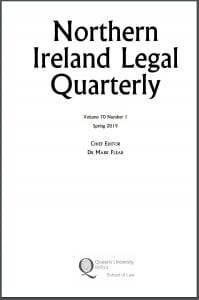By Prof John Coggon and Prof Judy Laing (Bristol University Law School)
 In October 2017, we were proud and honoured to mark the launch of the Centre for Health, Law, and Society (CHLS) in the University of Bristol Law School. The Centre is founded on ambitious aims to push the boundaries of scholarship in health law: expand its methods and approaches; broaden its practical reach and points of focus; enhance its place in shaping education; and increase its engagement with, relevance to, and impacts on people, organisations, regulators, and policy-makers across society.
In October 2017, we were proud and honoured to mark the launch of the Centre for Health, Law, and Society (CHLS) in the University of Bristol Law School. The Centre is founded on ambitious aims to push the boundaries of scholarship in health law: expand its methods and approaches; broaden its practical reach and points of focus; enhance its place in shaping education; and increase its engagement with, relevance to, and impacts on people, organisations, regulators, and policy-makers across society.
Our launch event allowed a showcase of the breadth of scholarly interest and inquiry within CHLS, as well as an opportunity to hear presentations from leading figures in health, law, and associated disciplines. We start from a basic premise that the value and significance of health requires understandings from ranging disciplinary perspectives, looking across social sectors and actors. We are interested in the roles served by law to protect and promote rights, achieve greater social justice, and to ensure that health and other fundamental values are secured fairly for all.
Since the time of our launch, CHLS has gone from strength to strength. Our community of students, academics and collaborators continues to grow. And we are delighted in March 2019 to publish a Special Issue of the Northern Ireland Legal Quarterly (NILQ), which shows well the depth, range and reach of our ambitions. The Special Issue comprises contributions from 11 of CHLS’ members, as well as from colleagues from other universities. They represent legal scholarship that engages with ethical considerations and social justice, history, human rights, philosophy, politics and social sciences. They approach questions spanning from very individualised rights, to population- and systems-level analyses.
Across the past decades, much scholarship in health and law has limited its focus to matters within health care practice. As indicated by the Special Issue, we recognise the importance of law to good, ethical health care. However, it is problematic if a focus on health care exhausts our inquiry, and leads scholars to miss wider impacts on health: to ignore historical context; to sideline neglected areas such as mental and public health; and to fail to account for the perspectives of ranging actors and persons affected by law and policy both within and beyond the healthcare system. As scientific understandings evolve, and the boundaries between health and social care and welfare shift, it is crucial to identify and approach these matters with critical understandings of the strengths and limits of law and governance, and the complementarity of cross-disciplinary and cross-sector approaches.
The NILQ Special Issue captures the essence of this crucial agenda for the next generation of health law scholarship. We hope that readers will enjoy each of the papers taken individually. But crucially, we also hope that what they represent as a collection is well understood, and helps motivate and contribute to new and exciting research and teaching agendas, and wider- and deeper-reaching collaborations and engagement with the many and multifarious persons, actors, and agencies whose lives, well-being, and practice are impacted by health law and policy.
*This blog originally appeared on the Northern Ireland Legal Quarterly Contributors Blog*
